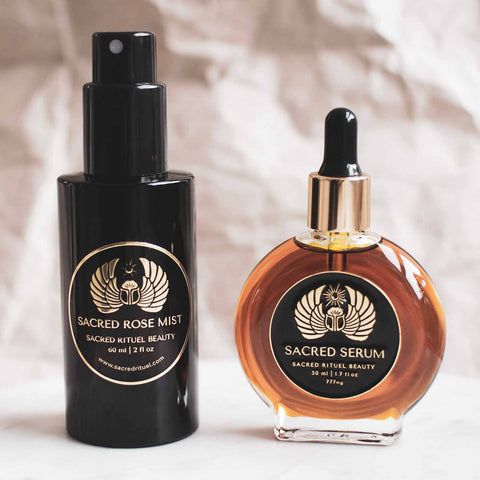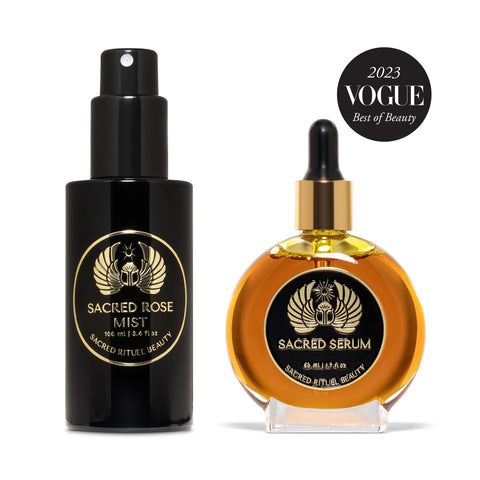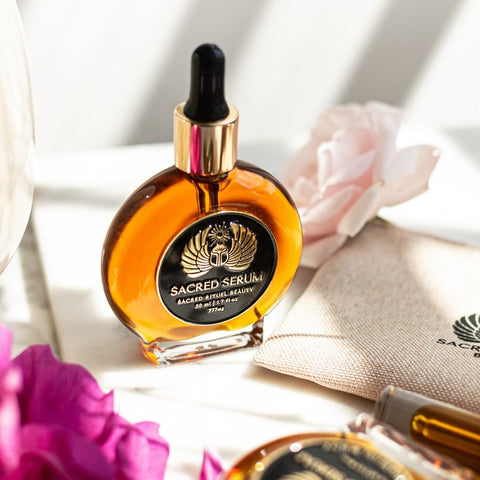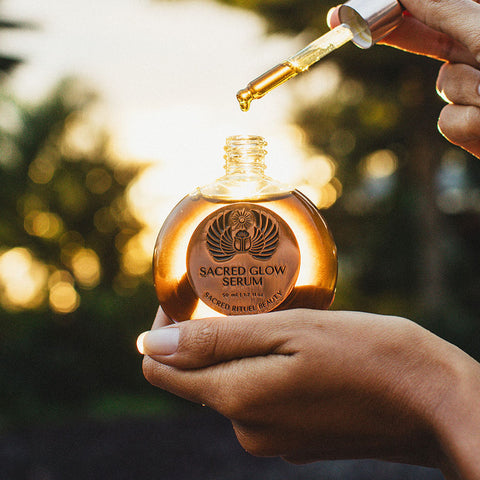Perfect Face Oil For Acne
At Sacred Rituel, we're not just experts in skincare; we're innovators in integrating the most effective, sustainable ingredients into products that truly perform. With a steadfast commitment to clean and organic formulations, our brand has become a trusted authority for consumers seeking remedies that are both safe and powerful.
This piece will illuminate the specific benefits of face oils for acne-prone skin, dispel common myths, and provide practical guidance on integrating these oils into your skincare regimen. Join us as we explore the optimal oils for combatting acne, ensuring your skin remains clear and radiant.
Products formulated with Arnica to address reduce skin inflammation, bruising, and swelling.

What Is Face Oil For Acne?
Definition Of Face Oil For Acne
Face oil for acne is specifically formulated to address the needs of acne-prone skin by providing essential moisture without exacerbating skin issues. Unlike typical moisturizers, these oils are carefully crafted to ensure they do not clog pores, which is crucial in preventing further breakouts. They are lightweight, absorb quickly, and leave a non-greasy finish, making them ideal for daily use. The unique formulation helps to balance the skin's natural oils, a key factor in managing acne effectively.
Ingredients And Properties
The ingredients in face oils for acne are chosen for their non-comedogenic and anti-inflammatory properties. Common ingredients include tea tree oil, which is renowned for its antibacterial qualities, and grapeseed oil, known for its light texture and high linoleic acid content. Other oils like hemp seed and rosehip oil also feature prominently, offering a rich source of omega fatty acids that help to heal and rejuvenate the skin. These ingredients work synergistically to soothe irritated skin and reduce acne flare-ups.
Benefits For Acne-Prone Skin
Using face oil for acne-prone skin offers several benefits beyond hydration. These oils help to reduce inflammation, a common issue for acne sufferers, and aid in the healing of acne scars. By reinforcing the skin's barrier, they also protect against environmental pollutants that can trigger breakouts. Regular use of these oils can lead to a noticeable improvement in skin texture and tone, contributing to a healthier, more balanced complexion.
Benefits Of Face Oil For Acne
Non-Comedogenic Hydration
Face oils for acne are expertly formulated to moisturize without clogging pores. These non-comedogenic properties ensure that the skin receives essential hydration without the risk of forming new acne. This is particularly important for acne-prone skin which requires hydration to remain healthy while avoiding exacerbation of acne conditions. By using ingredients that mimic the skin's natural oils, these face oils maintain effective hydration levels without adverse effects.
Anti-Inflammatory Effects
The anti-inflammatory properties of face oils are crucial for soothing acne-prone skin. Ingredients like chamomile and lavender oil provide natural anti-inflammatory benefits, reducing redness and calming irritated skin. This not only makes the skin look better but also feels more comfortable, helping to alleviate the discomfort often associated with acne. Regular application can lead to a noticeable reduction in skin inflammation over time.
Healing And Repair
Face oils for acne often promote healing and repair, which is essential for dealing with acne scars and damaged skin. Oils like rosehip and frankincense are known for their regenerative properties, helping to accelerate the healing process and improve the skin's overall texture. These oils encourage the renewal of skin cells, fading scars and marks left by acne. As a result, users can experience smoother, more even-toned skin.
Balancing Skin Oil Production
Balancing the skin's oil production is another significant benefit of using face oils. By providing the skin with a balanced supply of natural oils, these products help regulate sebum production, which is often a contributing factor to acne outbreaks. This regulation is key to preventing the cycle of dryness and oiliness that can trigger acne. With consistent use, face oils can help maintain a healthier, more stable skin environment.
Best Oils For Acne-Prone Skin
Several natural oils are particularly beneficial for acne-prone skin due to their unique properties that help manage breakouts and improve skin health:
- Tea Tree Oil - Tea tree oil is highly acclaimed for its antimicrobial and anti-inflammatory properties, making it an effective treatment for acne. It helps reduce the severity and frequency of breakouts by killing bacteria and reducing inflammation.
- Rosehip Oil - Rosehip oil is rich in vitamins and essential fatty acids that promote skin regeneration and elasticity. It is particularly effective in healing acne scars and reducing hyperpigmentation, making the skin appear more even-toned.
- Jojoba Oil - Jojoba oil closely mimics the natural sebum of the skin, which helps in regulating oil production and maintaining moisture balance. This property makes it excellent for acne-prone skin as it prevents excess oiliness and helps keep pores clear.
- Grapeseed Oil - Grapeseed oil is known for its light texture and high linoleic acid content, which is beneficial for acne-prone skin. It has antioxidant properties, which help to protect the skin from harmful free radicals and promote healing of acne lesions.
How To Incorporate Face Oil Into Your Skincare Routine
Step 1: Cleansing
To effectively incorporate face oil into your skincare routine, start with a thorough cleansing using a gentle, non-comedogenic cleanser. This first step is crucial as it ensures that your skin is free of any surface oils and dirt, making it more receptive to the face oil. Choose a cleanser that maintains the pH balance of the skin and does not strip it of its natural oils. Proper cleansing not only prepares your skin but also prevents the trapping of any impurities beneath the oil, which could exacerbate acne conditions.
Step 2: Applying The Face Oil
After cleansing and while the skin is still slightly damp, apply a few drops of face oil. Warming the oil by rubbing it between your palms before applying can help activate the natural ingredients. Gently press the oil onto your face using the fingertips, which promotes absorption without pulling or stretching the skin. This technique helps the oil penetrate deeper layers of the skin, where it can deliver the most benefits. Be mindful of the amount used; a little goes a long way.
Step 3: Moisturizing
Follow the oil application with a lightweight, non-comedogenic moisturizer to help lock in the oil and further hydrate the skin. This step creates a barrier that seals in the active ingredients of the face oil and the moisture, enhancing the overall efficacy of your skincare regimen. It's important that the moisturizer complements the face oil, not overwhelming it or causing any adverse reactions. The right moisturizer should feel comfortable on the skin and not too heavy or sticky.
Step 4: Consistency Is Key
Consistency in the application of face oil is vital for achieving and maintaining optimal results. Integrate face oil into your nightly routine, allowing it to work uninterrupted during the night when the skin's natural repair processes are most active. Regular use will help normalize oil production, diminish acne, and improve skin elasticity and texture over time. Be patient, as significant changes in skin health and appearance can take a few weeks to become apparent. Monitoring your skin's response can also guide any necessary adjustments to the routine.
Choosing The Right Face Oil For Your Skin Type
Understanding Your Skin Type
Knowing your skin type is the first crucial step in choosing the right face oil. Oily, dry, combination, and sensitive skin types each have unique needs that specific oils can address. For instance, oily skin benefits from lightweight oils that regulate sebum without adding excess oil, while dry skin may require richer, more emollient oils. Assessing your skin's tendencies—whether it's prone to acne, dryness, or sensitivity—helps tailor your choice to enhance your skin's natural balance.
Match Oil Properties With Skin Needs
Matching the properties of face oils with your skin's specific needs is essential for optimal results. For oily skin, oils high in linoleic acid such as grapeseed oil can help balance sebum levels. Dry skin might find relief with oils rich in oleic acid, like marula oil, which offers deep hydration and skin barrier reinforcement. Understanding these properties allows you to select an oil that complements your skin type, improving your skin's health and appearance.
Check For Allergens And Skin Reactivity
Before fully integrating a new face oil into your routine, it's crucial to conduct a patch test to check for allergens or reactivity. Apply a small amount of oil to a discreet area of skin and wait to see if there is any adverse reaction. This step is especially important for sensitive skin types, which are more prone to irritation. Choosing hypoallergenic oils or those with minimal ingredients can further reduce the risk of a negative reaction. Monitoring how your skin responds to the oil over a few days will provide insight into its suitability for regular use.
Read also:
- Solutions For Dry Skin Around Your Eyes
- Why Is My Skin So Dry Even When I Moisturize?
- Sensitive Skin Care: Choosing The Right Products
Frequently Asked Questions About Face Oil For Acne
What are the main ingredients in face oil for acne?
Face oils for acne are formulated with ingredients like tea tree oil, grapeseed oil, hemp seed oil, and rosehip oil. These ingredients are chosen for their non-comedogenic and anti-inflammatory properties. They effectively address acne without clogging pores.
How does face oil benefit acne-prone skin?
Face oils provide essential hydration, reduce inflammation, and help balance the skin's natural oil production. These benefits are crucial for maintaining healthy, clear skin without aggravating acne conditions. Regular use can improve skin texture and reduce breakouts.
Can face oil replace my regular moisturizer?
Face oil can sometimes be sufficient for hydration, but it is usually best used alongside a lightweight moisturizer. This combination helps to lock in moisture and the beneficial properties of the oil. Together, they keep the skin hydrated and protect against environmental stressors.
Are there any specific face oils recommended for oily skin types?
For oily skin, jojoba and grapeseed oils are highly recommended because they regulate sebum production and maintain moisture balance. These oils mimic the skin’s natural oils, preventing excess oiliness. They are effective in keeping the skin clear and non-greasy.
How often should I apply face oil to my acne-prone skin?
Face oil should be applied consistently as part of your nightly skincare routine for optimal results. Nightly application allows the active ingredients to work in synergy with the skin’s natural repair process. Over time, this routine helps normalize oil production and improve skin texture.
Is face oil suitable for sensitive skin?
Face oil can be suitable for sensitive skin, but choosing the right hypoallergenic oils and conducting a patch test is crucial. This ensures that the oil does not cause irritation or allergic reactions. If a reaction occurs, discontinue use and consult a dermatologist.
What steps should I follow to incorporate face oil into my skincare routine?
To effectively incorporate face oil, start with a clean base using a gentle cleanser. Apply the face oil on slightly damp skin to enhance absorption, followed by a moisturizer to seal in the oil and moisture. Consistency in this routine maximizes the beneficial effects on the skin.
Can face oil help with acne scars?
Face oils like rosehip and frankincense are beneficial for their healing and regenerative properties. They help fade scars and improve the overall texture of the skin. Regular use of these oils can lead to a visibly smoother and more even-toned complexion.
What should I do if my skin reacts negatively to a new face oil?
If you experience a negative reaction, immediately stop using the face oil. It is advisable to test the oil on a small skin area before fully integrating it into your routine. Consult a dermatologist if adverse effects continue.
How long does it take to see results from using face oil on acne-prone skin?
While individual results may vary, many users begin to notice improvements within a few weeks of consistent use. Significant changes in skin health and appearance can take longer. Monitoring your skin’s response over time will help adjust your routine for better results.


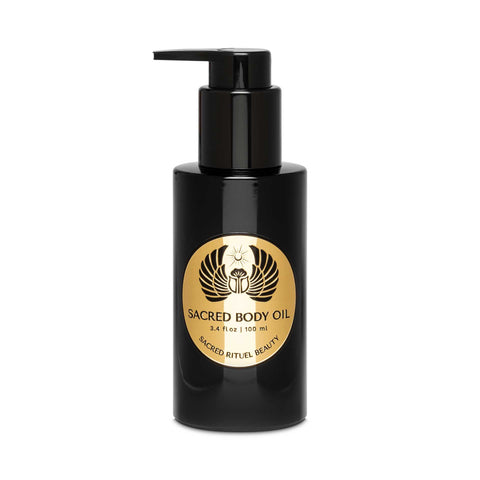
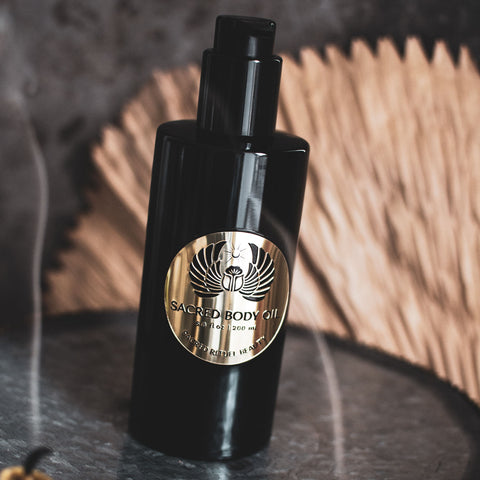
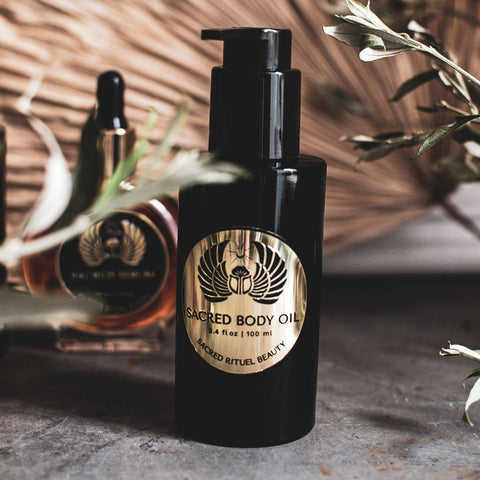
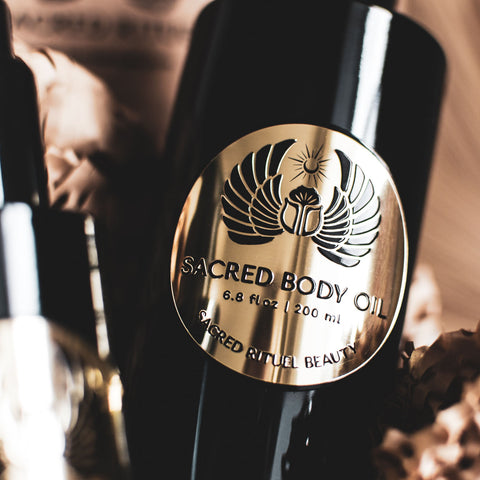
All Day Glow Essentials
Free Shipping on orders over $90
FREE Shipping on orders over $90 and $7 flat rate on all other orders (USA).
See our shipping policy.
Auto Delivery w/ a Subscription
Ensure you ALWAYS have a steady stream of SACRED RITUEL on hand!
Details in our subscriptions page.
No Hassle 30-day Returns
Try SACRED RITUEL for 30 days and send it back for a full refund if it doesn't completely meet your expectations.
Details in our return policy.
SACRED RITUEL is
High potency all organic skincare
Newsletter
Stay connected on wellness tips, exclusive sales and events!

